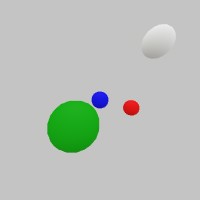pub struct Hierarchy;Expand description
This class represents a stack of transform matrices that build up a transform hierarchy! This can be used like an object-less parent-child system, where you push a parent’s transform onto the stack, render child objects relative to that parent transform and then pop it off the stack.
Performance note: if any matrices are on the hierarchy stack, any render will cause a matrix multiplication to occur! So if you have a collection of objects with their transforms baked and cached into matrices for performance reasons, you’ll want to ensure there are no matrices in the hierarchy stack, or that the hierarchy is disabled! It’ll save you a matrix multiplication in that case :) https://stereokit.net/Pages/StereoKit/Hierarchy.html
§Examples
use stereokit_rust::{maths::Matrix, system::{Hierarchy, HierarchyParent}, mesh::Mesh,
material::Material, util::named_colors};
let sphere = Mesh::generate_sphere(0.2, None);
let material = Material::pbr();
let transform = Matrix::t([0.4, 0.4, 0.4]);
filename_scr = "screenshots/hierarchy.jpeg";
test_screenshot!( // !!!! Get a proper main loop !!!!
sphere.draw(token, &material, transform, None, None);
assert!(Hierarchy::is_enabled(&token));
Hierarchy::push(token, Matrix::t([0.0, -0.5, -0.5]), None);
sphere.draw(token, &material, transform, Some(named_colors::RED.into()), None);
assert_eq!(Hierarchy::to_local_point(&token, [0.4, 0.4, 0.4]), [0.4, 0.9, 0.9].into());
assert_eq!(Hierarchy::to_world_point(&token, [0.4, 0.9, 0.9]), [0.4, 0.4, 0.4].into());
Hierarchy::pop(token);
Hierarchy::push(token, Matrix::t([-0.5, -0.5, 0.25]), Some(HierarchyParent::Ignore));
sphere.draw(token, &material, transform, Some(named_colors::GREEN.into()), None);
assert_eq!(Hierarchy::to_local_point(&token, [0.4, 0.4, 0.4]), [0.9, 0.9, 0.15].into());
assert_eq!(Hierarchy::to_world_point(&token, [0.9, 0.9, 0.15]), [0.4, 0.4, 0.4].into());
Hierarchy::enabled(token, false);
sphere.draw(token, &material, Matrix::IDENTITY, Some(named_colors::BLUE.into()), None);
assert_eq!(Hierarchy::to_local_point(&token, [0.4, 0.4, 0.4]), [0.4, 0.4, 0.4].into());
Hierarchy::enabled(token, true);
Hierarchy::pop(&token);
);
Implementations§
Source§impl Hierarchy
impl Hierarchy
Sourcepub fn enabled(_token: &MainThreadToken, enable: bool)
pub fn enabled(_token: &MainThreadToken, enable: bool)
This is enabled by default. Disabling this will cause any draw call to ignore any Matrices that are on the Hierarchy stack. https://stereokit.net/Pages/StereoKit/Hierarchy/Enabled.html
Sourcepub fn is_enabled(_token: &MainThreadToken) -> bool
pub fn is_enabled(_token: &MainThreadToken) -> bool
This is enabled by default. Disabling this will cause any draw call to ignore any Matrices that are on the Hierarchy stack. https://stereokit.net/Pages/StereoKit/Hierarchy/Enabled.html
see also hierarchy_is_enabled Hierarchy::enabled
Sourcepub fn pop(_token: &MainThreadToken)
pub fn pop(_token: &MainThreadToken)
Removes the top Matrix from the stack! https://stereokit.net/Pages/StereoKit/Hierarchy/Pop.html
see also hierarchy_pop Hierarchy::push
Sourcepub fn push<M: Into<Matrix>>(
_token: &MainThreadToken,
transform: M,
parent_behavior: Option<HierarchyParent>,
)
pub fn push<M: Into<Matrix>>( _token: &MainThreadToken, transform: M, parent_behavior: Option<HierarchyParent>, )
Pushes a transform Matrix (eventually a Pose) onto the stack, and combines it with the Matrix below it. Any draw operation’s Matrix will now be combined with this Matrix to make it relative to the current hierarchy. Use Hierarchy.pop to remove it from the Hierarchy stack! All Push calls must have an accompanying Pop call. https://stereokit.net/Pages/StereoKit/Hierarchy/Push.html
parent_behavior- This determines how this matrix combines with the parent matrix below it. Normal behavior is to “inherit” the parent matrix, but there are cases where you may wish to entirely ignore the parent transform. For example, if you’re in UI space, and wish to do some world space rendering. If None, has default value “Inherit”
see also hierarchy_push Hierarchy::pop
§Examples
use stereokit_rust::{maths::Matrix, system::{Hierarchy, HierarchyParent}};
test_steps! { // !!!! Get a proper main loop !!!!
Hierarchy::push(token, Matrix::t([0.0, -0.5, -0.5]), None);
assert_eq!(Hierarchy::to_local_point(token, [0.4, 0.4, 0.4]), [0.4, 0.9, 0.9].into());
assert_eq!(Hierarchy::to_world_point(token, [0.4, 0.9, 0.9]), [0.4, 0.4, 0.4].into());
Hierarchy::pop(token);
}Sourcepub fn to_local_point<V: Into<Vec3>>(
_token: &MainThreadToken,
world_point: V,
) -> Vec3
pub fn to_local_point<V: Into<Vec3>>( _token: &MainThreadToken, world_point: V, ) -> Vec3
Converts a world space point into the local space of the current Hierarchy stack! https://stereokit.net/Pages/StereoKit/Hierarchy/ToLocal.html
world_point- A point in world space.
Returns the provided point now in local hierarchy space
see also hierarchy_to_local_point Hierarchy::to_world_point
§Examples
use stereokit_rust::{maths::Pose, system::{Hierarchy, HierarchyParent}};
test_steps! { // !!!! Get a proper main loop !!!!
Hierarchy::push(token, Pose::new([0.0, -0.5, -0.5], None), None);
assert_eq!(Hierarchy::to_local_point(token, [0.4, 0.4, 0.4]), [0.4, 0.9, 0.9].into());
assert_eq!(Hierarchy::to_world_point(token, [0.4, 0.9, 0.9]), [0.4, 0.4, 0.4].into());
Hierarchy::pop(token);
}Sourcepub fn to_local_rotation<Q: Into<Quat>>(
_token: &MainThreadToken,
world_orientation: Q,
) -> Quat
pub fn to_local_rotation<Q: Into<Quat>>( _token: &MainThreadToken, world_orientation: Q, ) -> Quat
Converts a world space rotation into the local space of the current Hierarchy stack! https://stereokit.net/Pages/StereoKit/Hierarchy/ToLocal.html
world_orientation- A rotation in world space
Returns the provided rotation now in local hierarchy space
see also hierarchy_to_local_rotation Hierarchy::to_world_rotation
§Examples
use stereokit_rust::{maths::{Matrix, Quat, Vec3}, system::{Hierarchy, HierarchyParent}};
test_steps! { // !!!! Get a proper main loop !!!!
Hierarchy::push(token, Matrix::r([0.0, 0.0, 180.0]), None);
let local: Vec3 = Hierarchy::to_local_rotation(token, [90.0, 180.0, 0.0])
.to_angles_degrees().into();
assert_eq!(local, [-90.0, 0.0, 0.0].into());
let world: Vec3 = Hierarchy::to_world_rotation(token, [90.0, 180.0, 0.0])
.to_angles_degrees().into();
assert_eq!(world, [-90.0, 0.0, 0.0].into());
Hierarchy::pop(token);
}Sourcepub fn to_local_pose<P: Into<Pose>>(
_token: &MainThreadToken,
world_pose: P,
) -> Pose
pub fn to_local_pose<P: Into<Pose>>( _token: &MainThreadToken, world_pose: P, ) -> Pose
Converts a world pose relative to the current hierarchy stack into local space! https://stereokit.net/Pages/StereoKit/Hierarchy/ToLocal.html
world_pose- A pose in world space.
Returns the provided pose now in local hierarchy space!
see also hierarchy_to_local_pose Hierarchy::to_local_pose
§Examples
use stereokit_rust::{maths::{Matrix, Quat, Pose}, system::{Hierarchy, HierarchyParent}};
test_steps! { // !!!! Get a proper main loop !!!!
Hierarchy::push(token, Matrix::t([0.0, -0.5, -0.5]), None);
let pose = Pose::new([10.0, 20.0, 30.0], None);
assert_eq!(Hierarchy::to_local_pose(token, pose), Pose::new([10.0, 20.5, 30.5], None));
assert_eq!(Hierarchy::to_world_pose(token, Pose::new([10.0, 20.5, 30.5], None)), pose);
Hierarchy::pop(token);
}Sourcepub fn to_local_ray<R: Into<Ray>>(_token: &MainThreadToken, world_ray: R) -> Ray
pub fn to_local_ray<R: Into<Ray>>(_token: &MainThreadToken, world_ray: R) -> Ray
Converts a world ray relative to the current hierarchy stack into local space! https://stereokit.net/Pages/StereoKit/Hierarchy/ToLocal.html
world_ray- A ray in world space
Returns the provided ray now in local hierarchy space
see also hierarchy_to_local_ray Hierarchy::to_world_ray
§Examples
use stereokit_rust::{maths::{Vec3, Matrix, Quat, Ray}, system::{Lines, Hierarchy},
util::{named_colors}, mesh::Mesh, material::{Material, Cull}};
// Create Meshes
let cube = Mesh::generate_cube(Vec3::ONE * 0.8, None);
let sphere = Mesh::generate_sphere(1.0, Some(4));
let material = Material::pbr().copy();
let transform = Matrix::r(Quat::from_angles(40.0, 50.0, 20.0));
let inv = transform.get_inverse();
let ray = Ray::new([1.0, 2.0, 2.5 ], [-1.0, -2.0, -2.25]);
filename_scr = "screenshots/hierarchy_ray.jpeg";
test_screenshot!( // !!!! Get a proper main loop !!!!
let world_space_ray = Hierarchy::to_world_ray(token, ray);
assert_eq!(world_space_ray, ray);
Lines::add_ray(token, world_space_ray, 2.2, named_colors::WHITE, None, 0.02);
Hierarchy::push(token, transform, None);
let local_transform = Matrix::t([-0.1, 0.1, 0.1]);
cube.draw(token, &material, local_transform, Some(named_colors::MAGENTA.into()), None);
let local_space_ray = Hierarchy::to_local_ray(token, world_space_ray);
let mesh_space_ray = local_transform.get_inverse().transform_ray(local_space_ray);
let (contact_cube, ind_cube) = cube.intersect( mesh_space_ray, Some(Cull::Back))
.expect("Ray should touch cube");
assert_eq!(ind_cube, 15);
let local_contact_cube = local_transform.transform_point(contact_cube);
let transform_contact = Matrix::t_s(local_contact_cube, Vec3::ONE * 0.1);
sphere.draw(token, &material, transform_contact, Some(named_colors::YELLOW.into()), None );
Hierarchy::pop(token);
);
Sourcepub fn to_local_direction<V: Into<Vec3>>(
_token: &MainThreadToken,
world_direction: V,
) -> Vec3
pub fn to_local_direction<V: Into<Vec3>>( _token: &MainThreadToken, world_direction: V, ) -> Vec3
Converts a world space direction into the local space of the current Hierarchy stack! This excludes the translation component normally applied to vectors, so it’s still a valid direction. https://stereokit.net/Pages/StereoKit/Hierarchy/ToLocalDirection.html
world_direction- A direction in world space
Returns the provided direction now in local hierarchy space
see also hierarchy_to_local_direction Hierarchy::to_world_direction
§Examples
use stereokit_rust::{maths::{Matrix, Vec3}, system::{Hierarchy, HierarchyParent}};
test_steps! { // !!!! Get a proper main loop !!!!
Hierarchy::push(token, Matrix::r([0.0, 0.0, 180.0]), None);
assert_eq!(Hierarchy::to_local_direction(token, [1.0, 0.0, 0.0]), [-1.0, 0.0, 0.0].into());
assert_eq!(Hierarchy::to_world_direction(token, [-1.0, 0.0, 0.0]), [1.0, 0.0, 0.0].into());
Hierarchy::pop(token);
}see also hierarchy_to_local_direction hierarchy_to_world_direction
Sourcepub fn to_world_point<V: Into<Vec3>>(
_token: &MainThreadToken,
local_point: V,
) -> Vec3
pub fn to_world_point<V: Into<Vec3>>( _token: &MainThreadToken, local_point: V, ) -> Vec3
Converts a local point relative to the current hierarchy stack into world space! https://stereokit.net/Pages/StereoKit/Hierarchy/ToWorld.html
local_point- A point in local space
Returns the provided point now in world space
see also hierarchy_to_world_point
see example in Hierarchy::to_local_point
Sourcepub fn to_world_rotation<Q: Into<Quat>>(
_token: &MainThreadToken,
local_orientation: Q,
) -> Quat
pub fn to_world_rotation<Q: Into<Quat>>( _token: &MainThreadToken, local_orientation: Q, ) -> Quat
Converts a local rotation relative to the current hierarchy stack into world space! https://stereokit.net/Pages/StereoKit/Hierarchy/ToWorld.html
local_orientaion- A rotation in local space
Returns the provided rotation now in world space
see also hierarchy_to_world_rotation
see example in Hierarchy::to_local_rotation
Sourcepub fn to_world_pose<P: Into<Pose>>(
_token: &MainThreadToken,
local_pose: P,
) -> Pose
pub fn to_world_pose<P: Into<Pose>>( _token: &MainThreadToken, local_pose: P, ) -> Pose
Converts a local pose relative to the current hierarchy stack into world space! https://stereokit.net/Pages/StereoKit/Hierarchy/ToWorld.html
local_pose- A pose in local space
Returns the provided pose now in world space
see also hierarchy_to_world_pose
see example in Hierarchy::to_local_pose
Sourcepub fn to_world_ray<P: Into<Ray>>(_token: &MainThreadToken, local_ray: P) -> Ray
pub fn to_world_ray<P: Into<Ray>>(_token: &MainThreadToken, local_ray: P) -> Ray
Converts a local ray relative to the current hierarchy stack into world space! https://stereokit.net/Pages/StereoKit/Hierarchy/ToWorld.html
local_ray- A ray in local space
Returns the provided ray now in world space
see also hierarchy_to_world_ray
see example in Hierarchy::to_local_ray
Sourcepub fn to_world_direction<V: Into<Vec3>>(
_token: &MainThreadToken,
local_direction: V,
) -> Vec3
pub fn to_world_direction<V: Into<Vec3>>( _token: &MainThreadToken, local_direction: V, ) -> Vec3
Converts a local direction relative to the current hierarchy stack into world space! This excludes the translation component normally applied to vectors, so it’s still a valid direction. https://stereokit.net/Pages/StereoKit/Hierarchy/ToWorldDirection.html
local_direction- A direction in local space
Returns the provided direction now in world space
see also hierarchy_to_world_direction
see example in Hierarchy::to_local_direction
Auto Trait Implementations§
impl Freeze for Hierarchy
impl RefUnwindSafe for Hierarchy
impl Send for Hierarchy
impl Sync for Hierarchy
impl Unpin for Hierarchy
impl UnwindSafe for Hierarchy
Blanket Implementations§
Source§impl<T> BorrowMut<T> for Twhere
T: ?Sized,
impl<T> BorrowMut<T> for Twhere
T: ?Sized,
Source§fn borrow_mut(&mut self) -> &mut T
fn borrow_mut(&mut self) -> &mut T
Source§impl<T> Downcast for Twhere
T: Any,
impl<T> Downcast for Twhere
T: Any,
Source§fn into_any(self: Box<T>) -> Box<dyn Any>
fn into_any(self: Box<T>) -> Box<dyn Any>
Box<dyn Trait> (where Trait: Downcast) to Box<dyn Any>. Box<dyn Any> can
then be further downcast into Box<ConcreteType> where ConcreteType implements Trait.Source§fn into_any_rc(self: Rc<T>) -> Rc<dyn Any>
fn into_any_rc(self: Rc<T>) -> Rc<dyn Any>
Rc<Trait> (where Trait: Downcast) to Rc<Any>. Rc<Any> can then be
further downcast into Rc<ConcreteType> where ConcreteType implements Trait.Source§fn as_any(&self) -> &(dyn Any + 'static)
fn as_any(&self) -> &(dyn Any + 'static)
&Trait (where Trait: Downcast) to &Any. This is needed since Rust cannot
generate &Any’s vtable from &Trait’s.Source§fn as_any_mut(&mut self) -> &mut (dyn Any + 'static)
fn as_any_mut(&mut self) -> &mut (dyn Any + 'static)
&mut Trait (where Trait: Downcast) to &Any. This is needed since Rust cannot
generate &mut Any’s vtable from &mut Trait’s.